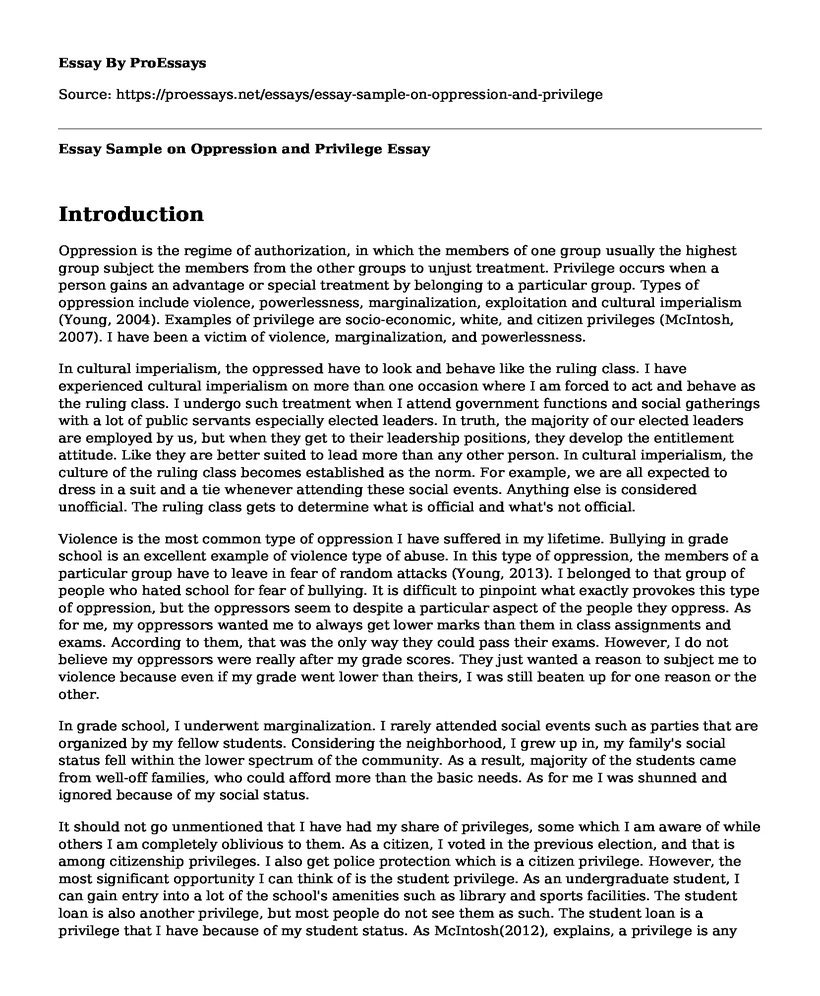Introduction
Oppression is the regime of authorization, in which the members of one group usually the highest group subject the members from the other groups to unjust treatment. Privilege occurs when a person gains an advantage or special treatment by belonging to a particular group. Types of oppression include violence, powerlessness, marginalization, exploitation and cultural imperialism (Young, 2004). Examples of privilege are socio-economic, white, and citizen privileges (McIntosh, 2007). I have been a victim of violence, marginalization, and powerlessness.
In cultural imperialism, the oppressed have to look and behave like the ruling class. I have experienced cultural imperialism on more than one occasion where I am forced to act and behave as the ruling class. I undergo such treatment when I attend government functions and social gatherings with a lot of public servants especially elected leaders. In truth, the majority of our elected leaders are employed by us, but when they get to their leadership positions, they develop the entitlement attitude. Like they are better suited to lead more than any other person. In cultural imperialism, the culture of the ruling class becomes established as the norm. For example, we are all expected to dress in a suit and a tie whenever attending these social events. Anything else is considered unofficial. The ruling class gets to determine what is official and what's not official.
Violence is the most common type of oppression I have suffered in my lifetime. Bullying in grade school is an excellent example of violence type of abuse. In this type of oppression, the members of a particular group have to leave in fear of random attacks (Young, 2013). I belonged to that group of people who hated school for fear of bullying. It is difficult to pinpoint what exactly provokes this type of oppression, but the oppressors seem to despite a particular aspect of the people they oppress. As for me, my oppressors wanted me to always get lower marks than them in class assignments and exams. According to them, that was the only way they could pass their exams. However, I do not believe my oppressors were really after my grade scores. They just wanted a reason to subject me to violence because even if my grade went lower than theirs, I was still beaten up for one reason or the other.
In grade school, I underwent marginalization. I rarely attended social events such as parties that are organized by my fellow students. Considering the neighborhood, I grew up in, my family's social status fell within the lower spectrum of the community. As a result, majority of the students came from well-off families, who could afford more than the basic needs. As for me I was shunned and ignored because of my social status.
It should not go unmentioned that I have had my share of privileges, some which I am aware of while others I am completely oblivious to them. As a citizen, I voted in the previous election, and that is among citizenship privileges. I also get police protection which is a citizen privilege. However, the most significant opportunity I can think of is the student privilege. As an undergraduate student, I can gain entry into a lot of the school's amenities such as library and sports facilities. The student loan is also another privilege, but most people do not see them as such. The student loan is a privilege that I have because of my student status. As McIntosh(2012), explains, a privilege is any special treatment given to a person because they are a member of a specific group.
References
McIntosh, P. (2007). White privilege and male privilege. Race, Ethnicity, and Gender: Selected Readings, 377-385.
McIntosh, P. (2012). Reflections and future directions for privilege studies. Journal of Social Issues, 68(1), 194-206.
Tomlinson, J. (2001). Cultural imperialism: A critical introduction. A&C Black.
Young, I. (2004). Five Faces of Oppression. Retrieved from Wordpress: https://mrdevin.files.wordpress.com/2009/06/five-faces-of-oppression.pdf
Young, I. M. (2013). Five faces of oppression. In The community development reader (pp. 346-355). Routledge.
Cite this page
Essay Sample on Oppression and Privilege. (2022, Jul 08). Retrieved from https://proessays.net/essays/essay-sample-on-oppression-and-privilege
If you are the original author of this essay and no longer wish to have it published on the ProEssays website, please click below to request its removal:
- Terrorism Liaison Officer's Decision Making Video Analysis
- Research Paper on "White Flight" or Positive Contact? Local Diversity and Attitudes to Immigration in Britain
- Critical Reflection on the Plight of Immigrants in Relation to My Experience as an E.U. Citizen Living in the U.K.
- Literary Analysis Essay on Faithless
- Essay Sample on Women in Terrorism: The Neglected Security Threat
- Essay Sample on Racism in Maycomb: Whites' Superiority and Blacks' Oppression
- A Satirical Proposal: Redefining Solutions to Poverty in the United States - Paper Example







